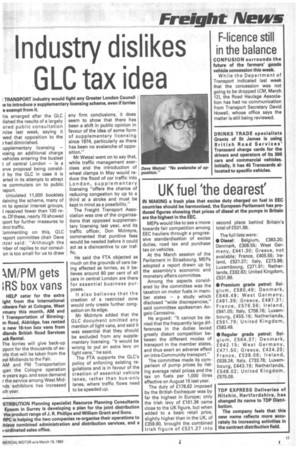Industry dislikes GLC tax idea
Page 19

If you've noticed an error in this article please click here to report it so we can fix it.
. TRANSPORT industry would fight any Greater London Council is to introduce a supplementary licensing scheme, even if lorries e exempt from it.
us emerged after the GLC lished the results of a largely ored public consultation rcise last week, saying it wed that opposition to the a had diminished.
upplementary licensing — osing an additional charge vehicles entering the busiest t of central London — is a arve proposal being considd by the GLC in case it is arted in its attempts to attract re commuters on to public isport.
circulated 11,000 booklets laining the scheme, many of m to special interest groups, I received fewer than 100 re;s. Of these, nearly 70 showed )port for further measures to itrol traffic.
:ommenting on this, GLC 'sport committee chair Dave Itzel said: "Although the Tiber of replies to our consulon is too small for us to draw any firm conclusions, it does seem to show that there has been a shift in public opinion in favour of the idea of some form of supplementary licensing since 1974, particularly as there has been no avalanche of opposition."
Mr Wetzel went on to say that, while traffic management exercises and the introduction of wheel clamps in May would reduce the flood of car traffic into London, supplementary licensing "offers the chance of reducing congestion by up to a third at a stroke and must be kept in mind as a possibility."
The Freight Transport Association was one of the organisations that opposed supplementary licensing last year, and its traffic officer, Don McIntyre, commented that punitive fees would be needed before it could act as a disincentive to car traffic.
He said the ETA objected as much on the grounds of cars being affected as lorries, as it believes around 60 per cent of all cars in central London are there for essential business purposes.
It also believes that the creation of a restricted zone would only create further congestion on its edge.
Mr McIntyre added that the GLC document omitted any mention of light vans, and said it was essential that they should be excluded from any supplementary licensing. "It would be wrong to put an extra levy on light vans," he said.
The FTA supports the GLC's policy of enforcing existing regulations and is in favour of the creation of essential vehicle lanes, rather than bus-only lanes, where traffic flows need to be speeded up.












































































































